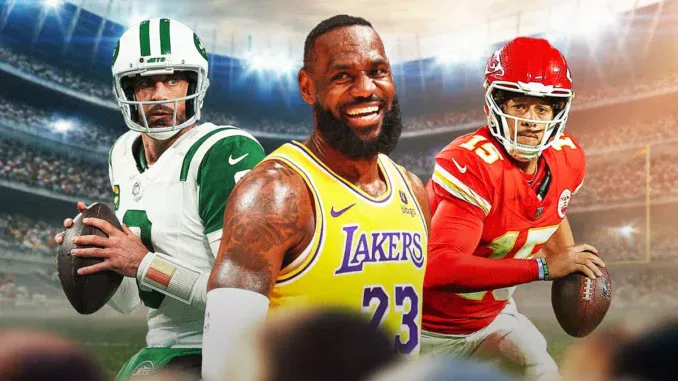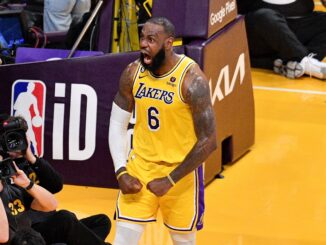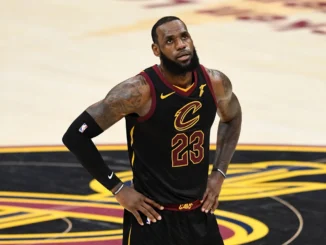
LeBron James and Patrick Mahomes are two of the most prominent figures in their respective sports, basketball and football. Both have not only achieved extraordinary success on the court and field but have also established themselves as leaders and voices within their communities and beyond. Recently, LeBron’s comments regarding Aaron Rodgers resonated with Mahomes’ honest take on the Green Bay Packers quarterback, sparking discussions about leadership, legacy, and the nature of greatness in professional sports.
In the realm of sports, few athletes have generated as much conversation as Aaron Rodgers. The Green Bay Packers’ quarterback has long been a figure of both admiration and controversy. His talent is undeniable; he possesses an arm that can make any throw and a football IQ that allows him to read defenses like few others. However, his off-field antics, including contentious contract negotiations and candid comments about the league and his team, often overshadow his accomplishments. This duality has led to varying opinions about his legacy in the NFL.
When LeBron James recently weighed in on the topic, it felt significant. LeBron is known for his strong opinions and willingness to speak on social issues, but he also offers insight into the inner workings of sports. His comments regarding Rodgers echoed those of Mahomes, who had previously expressed a mix of admiration and frustration with the quarterback’s recent behavior. Mahomes acknowledged Rodgers’ incredible talent while also highlighting the importance of being a team player and fostering good relationships within the locker room.
LeBron’s take on Rodgers was similarly nuanced. He acknowledged Rodgers’ immense talent, describing him as one of the best quarterbacks in the game. However, he emphasized that true greatness transcends raw ability; it requires a commitment to team dynamics and a sense of responsibility toward teammates. This perspective aligns with Mahomes’ philosophy, which focuses on building strong, cohesive teams that can weather adversity together.
Both LeBron and Mahomes understand that sports are not just about individual talent but also about collaboration and leadership. They exemplify these qualities in their own careers. LeBron, a four-time NBA champion and four-time MVP, has consistently made those around him better, whether through his passing skills on the court or his mentorship off it. He has a keen sense of how to elevate his teammates, creating an environment where everyone feels valued and motivated. Similarly, Mahomes, the Kansas City Chiefs’ star quarterback, has fostered a culture of unity and resilience in his locker room, leading by example both on and off the field.
The dialogue around Rodgers highlights an important aspect of professional sports: the impact of personality and leadership style on a team’s success. While talent can take a player far, the ability to inspire and galvanize a team is what often leads to championships. LeBron’s reflection on this issue suggests a deeper understanding of what it means to be a leader in high-pressure environments.
Moreover, the contrast between the approaches of LeBron and Mahomes versus Rodgers speaks volumes about the evolving nature of sports leadership. In the past, it was often accepted that an athlete’s talent alone would be enough to secure a legacy. However, in today’s sports landscape, where teamwork and collaboration are paramount, the focus has shifted. LeBron and Mahomes are both champions who embody this modern ethos, advocating for a more holistic approach to leadership that includes emotional intelligence and communication.
Additionally, LeBron’s insights resonate within the broader context of sports culture. The way athletes interact with one another, the media, and their fans has changed dramatically over the years. With the rise of social media, athletes are now under constant scrutiny, and their every word can lead to widespread discourse. LeBron and Mahomes navigate this landscape adeptly, often using their platforms to promote unity and understanding. In contrast, Rodgers’ sometimes polarizing statements can lead to divisions, not just among fans but also within his own team.
This evolution in athlete discourse also reflects broader societal changes. Fans are increasingly looking for authenticity and accountability from their heroes. LeBron and Mahomes represent this shift, as they use their voices to not only discuss sports but also to tackle social issues, inspire younger generations, and foster inclusivity. Their comments on Rodgers suggest a desire for all athletes, regardless of their accomplishments, to recognize the weight of their influence and the importance of teamwork.
In conclusion, the dialogue initiated by LeBron James and echoed by Patrick Mahomes regarding Aaron Rodgers illuminates critical themes in modern sports. It serves as a reminder that greatness is not solely measured by individual accolades but also by the ability to lead and uplift those around you. As the sports world continues to evolve, the need for strong, empathetic leaders becomes ever more important. LeBron and Mahomes embody this new standard, advocating for teamwork, respect, and a sense of community, while calling for athletes like Rodgers to embrace these values as well. In the end, the future of sports leadership lies not just in individual brilliance but in the collective strength of a united team.



Be the first to comment